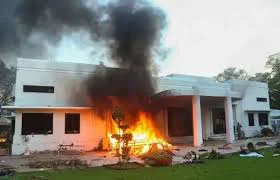May 9 Riots: Military Court Sentences Imran Khan's Nephew Among 60 Culprits
0
December 26, 2024
May 9 Riots: Military Court Sentences Imran Khan's Nephew Among 60 Culprits
In a significant development following the May 9 riots, military courts have handed down sentences to 60 more individuals, including Hassaan Niazi, the nephew of former Prime Minister Imran Khan. These individuals were found guilty of involvement in the violent protests that erupted across Pakistan after Khan's arrest earlier this year.
The protests, which targeted military installations and government properties, are considered one of the most significant episodes of civil unrest in Pakistan's recent history. The Army Chief, General Asim Munir, had earlier vowed to bring the perpetrators to justice under the Pakistan Army Act and the Official Secrets Act, marking a strong stance on accountability for those involved in the attacks.
Who is Hassaan Niazi?
Hassaan Niazi, a prominent lawyer and political activist, has been a vocal supporter of his uncle, Imran Khan, and a key figure in the Pakistan Tehreek-e-Insaf (PTI) party. His involvement in the riots has been a contentious issue, with his legal team consistently denying his presence at any attack sites. However, military prosecutors argued otherwise, presenting evidence that linked Niazi to the storming of sensitive military facilities.
Niazi’s sentencing has sent shockwaves through PTI ranks, where many see the military court trials as politically motivated. His conviction is viewed by Khan’s supporters as part of a broader crackdown on the former Prime Minister’s party, which has faced mass arrests and defections since the May 9 incidents.
The May 9 Riots: A Dark Day in Pakistan's History
The May 9 riots began after the dramatic arrest of Imran Khan on corruption charges. His detention sparked protests in cities nationwide, with demonstrators targeting key military and government installations. The attacks included the storming of the General Headquarters (GHQ) in Rawalpindi and the destruction of the Corps Commander’s house in Lahore, known as Jinnah House.
The violence left a deep scar on the nation, with analysts describing it as an unprecedented challenge to the military's authority. Following the unrest, the government declared a zero-tolerance policy for those involved, leading to widespread arrests and trials in military courts.
Military Court Proceedings
Under Pakistani law, individuals can be tried in military courts for offenses related to attacks on defense installations or acts that undermine the country’s security. The trials, however, have sparked criticism from human rights organizations, which argue that military courts lack transparency and fail to meet international standards of due process.
The sentencing of these 60 individuals marks another phase in the crackdown on those accused of orchestrating and participating in the violence. Military prosecutors presented video evidence, forensic reports, and testimonies during the trials, which reportedly confirmed the accused's involvement in attacks on military property.
In addition to Niazi, several other PTI leaders and activists are also facing trials. Many of them are accused of inciting violence, organizing protests, and directly participating in the attacks. The convictions have raised questions about the future of PTI as a political force, given the massive legal and political challenges it faces.
Government and Military's Stance
The government and the military have justified the military court trials, citing the severity of the attacks and the threat they posed to national security. Information Minister Marriyum Aurangzeb reiterated the state’s commitment to holding all culprits accountable, stating that “no one, regardless of their political or social status, is above the law.”
General Munir also emphasized that the May 9 riots were not spontaneous but part of a calculated conspiracy to weaken the state. The Army Chief’s strong statements reflect the institution’s determination to prevent any such incidents in the future.
Criticism and Implications
The military court sentences have drawn criticism from human rights groups, including Amnesty International and Human Rights Watch. They argue that the trials lack transparency and deny the accused their right to a fair trial in civilian courts. The government has dismissed these concerns, asserting that due process is being followed.
The political fallout of these convictions is significant. PTI, once Pakistan's most popular political party, is now struggling to maintain its relevance amid defections, arrests, and legal challenges. Imran Khan, currently facing multiple cases, has accused the government and military of orchestrating a campaign to dismantle his party.
Conclusion
The sentencing of Imran Khan's nephew, along with 59 others, underscores the government's resolve to address the May 9 riots through stringent measures. While the military courts have been effective in delivering swift judgments, the lack of transparency and fair trial guarantees continues to be a point of contention.
As Pakistan navigates this politically charged period, the implications of these convictions on the country's democratic and judicial landscape remain to be seen. The May 9 riots and their aftermath serve as a stark reminder of the deep divisions within Pakistan’s political and societal fabric.
Tags












